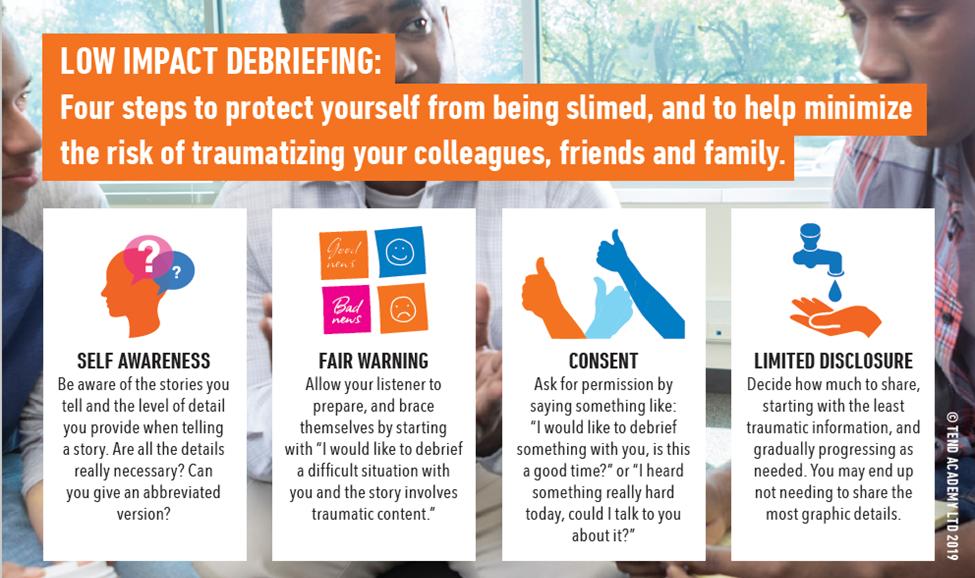
INSIDER Summer 2023 THE OFFICIAL MAGAZINE OF WASHINGTON’S ADULT PROTECTIVE SERVICES Get to Know Our HQ Operations Research Specialist p.4 Discover Workgroup Updates: Academy, Competencies, and Policy Progress p.9 Learn How to Embrace Authenticity in the Workplace p.13 LOW-IMPACT DEBRIEFING: STRATEGIES FOR WELL-BEING AND QUALITY SERVICES Blooming Orchards at Mt. Adams 11
Adult Protective Services



is dedicated to serving vulnerable adults. We investigate reports about abuse, abandonment, neglect, exploitation and self-neglect of vulnerable adults in Washington State. We collaborate with other agencies to offer protective services as needed. Our goal is to promote lives free of harm while respecting individual choice.



SUMMER 2023 | CONTENTS >> DEPARTMENTS | >> FEATURES | >> 2 Director’s Welcome Combatting Workforce Burnout: Essential Strategies and Resources to Support APS Professionals in Preventing and Mitigating the Silent Crisis 3 Deputy Director’s Welcome Empowering Recovery: Redefining Substance Use in vulnerable adults 4 Headquarters Spotlight Meet the APS Operations Research Specialist Dave Beacham 5 Employee Spotlight Sharing staff achievements and excellence across Washington 7 Updates & Information Dive into our latest updates on grant projects and policy transformations! 15 Regional Success Stories Learn how APS is transforming lives throughout the State 20 Upcomming Events 11 CISM Corner Protecting Those Who Protect: Preventing the Contagion Effect of Secondary Trauma Among Helping Professionals Through Low Impact Debriefing 13 EDAI Embracing Authenticity in the Workplace: Unleashing the Power of Being Your True Self and Creating a Supportive Environment for Others 17 Getting to Know One Another: Jennifer Crawford A Dedicated APS Supervisor Whose Passion for Service Shines Through, Inspiring Others to Make a Difference in the Lives of Vulnerable Adults 17 1
11 13 TABLE OF CONTENTS BE YOUR AUTHENTIC SELF
WORKFORCE BURNOUT: PREVENTION MITIGATION STRATEGIES

As a longtime social services administrator, I’m intimately familiar with the pressing issues impacting Adult Protective Services professionals, the stressors and challenges associated with our work.

Ongoing stressors can sometimes lead to burnout, a state of emotional, physical, and mental exhaustion caused by prolonged stress. The nature of the work can sometimes lead to feeling overwhelmed. Consequently, this can breed a sense of depersonalization and a decreased sense of personal accomplishment, both symptomatic of burnout. Recognizing and validating these experiences is the first step toward prevention and mitigation.
job. Initiatives for team building and peer support can foster a shared sense of purpose and camaraderie, both of which can be beneficial in combating burnout.
As we continue to tackle societal challenges our vulnerable adults face, let’s pledge to support and tirelessly advocate for one another. We must strive to create an environment that nurtures our wellbeing. Navigating the landscape of our work can be emotionally draining and stressful. Recognizing the importance of preventing and mitigating burnout, we’ve compiled a list of critical resources. These tools aim to equip you with essential knowledge and practical strategies to maintain your well-being, boost your resilience, and sustain your commitment to serving our vulnerable adults.
Sign up for one of The Leaning Center’s many offerings on the subject of burnout:
• Prevent And Overcome Burnout for Supervisors and Managers
• Prevent And Overcome Burnout for Those Who Do Not Supervise
• Alleviating Compassion Fatigue and Avoiding Burnout
• Work Life Harmony - Not Balance!
Open conversations about burnout should be encouraged within the workplace. Leaders should regularly check in with staff to understand their workload, pressures, and emotional well-being, which will help identify early signs of burnout and allow for timely intervention.
Creating a supportive work environment is crucial in preventing and mitigating burnout. Promoting a sense of community, mutual respect, and trust among APS staff can act as a buffer against the emotional strain of the
Take a breather with mindfulness apps like Headspace, Calm, or Insight Timer.
It is important to maintain your health, happiness, so we can continue doing the vital work of APS. Remember, taking care of yourself isn’t a luxury; it’s a necessity for you to continue to serve others effectively. Start your journey towards burnout prevention and self-care today by exploring these links and resources. Our regional CISM staff are a great resource so please reach out!
Director’s Welcome
2
Kathy Morgan is the director of Washington’s Adult Protective Services
“APS staff need to know their experiences of stress and exhaustion are not figments of their imagination but are genuine experiences shared by others in the profession.”
Addressing Substance Use: Integrating Service Delivery

Our principal responsibility is to uphold the well-being and dignity of the most vulnerable adults in our community. Our multifaceted mission encompasses safeguarding their rights, promoting their independence, and improving their overall quality of life. A critical challenge that we encounter in achieving these goals is substance use. This issue affects not only the individuals we serve but also the societal fabric of Washington State.
Substance use is not a one-time event. Instead, it is a chronic condition that infiltrates all aspects of an individual’s life, from physical health to societal integration. Our approach to addressing substance use within Washington’s Adult Protective Services framework must be comprehensive and centered around personfirst language.
In adopting person-first language, we emphasize each person’s humanity, individuality and worth before mentioning their challenges. This approach underscores the term “person with a substance use disorder” instead of “substance abuser,” thereby reducing the stigma associated with substance use while focusing on the individual. However, incorporating person-first language is just the starting point. A comprehensive approach to handling substance use requires an integrated service delivery model tailored to each individual’s unique needs. This integration involves a cross-sector collaboration between healthcare providers,
social services, housing authorities, and employment services, forming a supportive network around each person. This holistic model ensures that individuals receive immediate treatment for substance use and support for underlying social determinants that often contribute to these conditions.
For instance, healthcare providers can work closely with mental health professionals, given the common co-occurrence of substance use and mental health disorders. We can provide an inclusive healthcare approach by combining medical treatment for substance use disorder and mental health therapy.
At the same time, social services and housing authorities can collaborate to ensure stable and safe living conditions for each individual during and after treatment, significantly improving recovery chances. Employment services also play a crucial role by offering training and job placement. Employment provides a sense of purpose and structure and the means to maintain independence and high quality of life.
Our response to substance use in Washington State must mirror the complexity of the problem. A thoughtful, coordinated, personcentered strategy must respect each individual’s autonomy and acknowledge their journey toward recovery. The change begins with us - in the language we use, the services we provide, and the partnerships we form. By fostering a conducive environment for recovery and reducing the stigma of substance use disorders, we can empower individuals to live their lives fully.
Our ultimate goal in addressing substance use is empowering individuals to reclaim their lives. By integrating service delivery approaches, we can provide comprehensive care that respects the dignity and worth of each person we serve.
Deputy Director’s Welcome
3
Paula Hughes, M.Ed., CDE is the deputy director of Washington’s Adult Protective Services
Headquarters
Spotlight Operations Research Specialist
Dave grew up in a small town in eastern Utah where he spent his youth hiking, fishing, camping, hunting, and performing in theater and music at every available opportunity. Dave enlisted as an early entry in the Army National Guard and after basic training went on to study at Southern Utah University. In university Dave focused initially on musical theatre, opera, and radio presentation before realizing the possibility of fame and becoming the next Pavarotti was a long shot and ultimately graduated with a degree in psychology in 1994.
as an announcer for Roller Derby. Dave’s performance has slowed since pandemic, but he still enjoys playing guitar and singing the occasional open mic.

Dave has a passion for music, movies, cigars, cooking, and spends his free time singing karaoke or hiking to visit the many waterfalls and Pleistocene era glacial erratics found in the Puget Sound region.
 Dave Beacham is the Operations Research Specialist for Washington’s Adult Protective Services
Dave Beacham is the Operations Research Specialist for Washington’s Adult Protective Services
After university Dave moved to Olympia Washington with his amazing, brilliant, talented, and always entertaining wife Wenny. Dave managed and performed with Scatterbrains Improv Comedy for 15 years along with performing in numerous theater productions, vaudeville productions, and spending time
Dave has worked within DSHS for 28 years with 22 years of his career spent within Adult Protective Services where he started as an investigator. In his time with APS Dave has also spent time as a supervisor, SHPC, and Regional Subject Matter Expert before coming to APS headquarters where he was initially on the training team before becoming the divisions Operations Research Specialist.
Dave has stayed with Adult Protective Services as he believes his work makes a difference every day by helping keep the program moving forward and improving by managing changes and fixes in TIVA2, DataMart, PowerBI and assisting others whenever problems or opportunities for improvements arise.
4 HQ Spotlight
EMPLOYEE SPOTLIGHT

Recognizing Excellence in Our Workforce
Lorena joined APS as an investigator in 2016 and was promoted to supervisor in 2019.
Lorena has an amazing, cohesive team of seven investigators stationed in the Walla Walla and Clarkston offices. Lorena is extremely passionate about her team and the clients served. She encourages her team to always go the extra mile and leave the clients better than we found them.
Lorena knows the work of APS investigators is challenging, so she always makes time for her team, listens and actively watches for nonverbal symptoms of stress and distress, so she can provide support to them early and often.
Lorena also supports her team to do their best work by providing ongoing training, which is
demonstrated by their thorough investigations and frequent investigations brought before Investigation Review Teams (IRT). Lorena is a member of two Regional Resource Teams, interfacing with community partners for the sake of vulnerable adults in challenging cases. Lorena is always willing to step in and assist with field visits and court dates when her team needs additional back-up support or to fill in for them if something unexpected comes up.
When Lorena is not at work, you can find her fishing. If she is not fishing, she is writing fiction or articles for literary magazines, caring for her mother, Beverly, or hanging out with her adorable cat, Skittles.
We are fortunate to have Lorena in Region 1 as she is dedicated to protecting vulnerable adults and providing her team with all the support, she can give them.
Insightful, Bright, Humble, Caring, Fearless, Authentic, Friend that is Alda! Leo Puchalvert, who currently supervises Alda, said how happy he is to have her on his new team. He mentioned, “Alda chose to be a part of the Case
5 Employee Spotlight
Aide team. She immediately shined in the team, not just because of her skills, but because of her positive outlook. She is encouraging, enthusiastic, and puts a smile on everything she does. She is selfless and uses her knowledge for the common good, always keeping a humble attitude.”

Alda also has an inspiring story. From her personal experiences as a first generation American, to her professional growth and career advancement. She has never stopped pursuing the life she desires and chooses to help others along the way. I asked Alda why Social Work?

Like most of us in this field, I think we are drawn to people and their stories. Alda echoed this by telling me that over time she has “developed a passion for assisting vulnerable populations, making connections, and having very human interactions.” “I continue to choose social work because I value making others feel valued. If I’m able to achieve that, then I think I’m doing my part in the world.”

Arnold Vasquez-Ruelas from the Vancouver office recently went above and beyond in seeking suitable intervention services for a vulnerable adult couple. Arnold spent extensive

hours seeking assistance for the clients, including frequent in-person visits with them to check on their safety and wellness. He worked diligently to build rapport with them to have a to better understand their needs. His thorough investigation work got nessessary services implemented quickly. Arnold communicated with other agencies to ensure the clients’ safety and quality of life were improved. Arnold has been with APS for only 7 months and already has demonstrated he can excel as an investigator and has achieved remarkable proficiency in his work.
Arnold has a positive attitude, and gets along well with everyone. Arnold was recently selected as our Program Manager’s MVP at our Vancouver/Kelso Unit All-Staff Meeting in January 2023.
Arnold’s excellent work ethic, integrity, ability to be a team player, great communication skills and hard work came together to make a positive outcome for the clients in this case. While he continues to grow and learn with APS, Arnold has already proven to be a valuable asset to our team.
Alda Sarmiento is a Social Services Specialist in Region 2’s Everett office in Washington’s Adult Protective Services
Lorena Swift is an APS Supervisor for Region 1’s Walla Walla Office in Washington’s Adult Protective Services
6
Arnold Vasquez-Ruelas is a Social Services Specialist Region 3’s Vancouver office in Washington’s Adult Protective Services
Mountain Goats on Hurricane Hill Olympic National Park
Updates & Information
GRANT UPDATES
Grant work continued throughout the spring and updates to major projects are included. If you’d like to hear more about our grant work, contact Victoria Gawlik Morse.
ELDER JUSTICE ACT – GRANTS TO ENHANCE ADULT PROTECTIVE SERVICES


COVID RESPONSE AND RELIEF ACT

This grant will end September 2023 and has been fully expended. Most charges that were coming out of this grant will be shifted to American Rescue Plan funding including:
• Goods purchases for alleged victims. Goods purchases will continue for alleged victims.
• Mental health first aid (MHFA) trainings for APS staff. MHFA trainings will continue to be offered monthly to all APS staff. Be sure to discuss registration with your supervisor as supervisor approval is required.
• Any staff positions that were being covered by this grant.
AMERICAN RESCUE PLAN (I & II)
This grant will end September 2023 and it almost entirely expended.
• Risk and safety screening tools: Data from these tools is being incorporated into DataMart for analysis. Data for both tools should be available in a summer update.

• Forensic interviewing: Our partners, the University of Washington Alliance, continue to train cohorts of APS staff in the protocol. To date, 510 staff have been trained in forensic interviewing. Work continues on a separate project to enhance the curriculum to include specific training for alleged perpetrators. See the American Rescue Plan update for additional information.
• Goods purchases for alleged victims. As stated in the COVID update, goods purchases for alleged victims can continue. These purchases will now be charged to the ARPA grant instead of the COVID grant. In practice, there will be no changes to how your purchases are made.
7 Updates & Information
• Forensic interviewing: The materials for the forensic interviewing for alleged perpetrators curriculum were reviewed and finalized. A pilot test by UW Alliance occurred at the end of June, and has been completed and updated to reflect any necessary changes. After this step is complete, the curriculum will be available for APS staff.
• Supervisor academy: The workgroup and Supervisor SME groups have been selected for the supervisor academy build. Each group has met multiple times to review the curriculum outline for the training. Once the outline is approved, the Alliance will begin building it with input from both groups. The pilot test of this curriculum is planned for the fall.
• Case aides: Each region is staffed with case aides. Case aides are receiving training on the APS program and are working with their supervisors to improve processes and workflows. If you haven’t met or used a case aide in your region yet, reach out to them to say hello.
• UW program evaluation: All staff interviews and staff surveys have been completed. If you gave an interview or completed a survey – thank you for your time and honesty. Your feedback along with programmatic data and other analysis (including programmatic comparisons) are being incorporated into a final report by the evaluation team. This project will end 9/30/2023, and APS should receive the final report mid-Fall.
• Tribal mini-grants: 5 federally recognized Tribes in Washington State applied for and received funding to enhance services for their vulnerable adult populations. The recipient Tribes are: Port Gamble S’Klallam, Puyallup Tribe of Indians, Quileute Tribe, Samish Indian Nation, and Yakama Nation. Each Tribe is working to spend their allocated funding on allowable purchases as outline by the grant.
POLICY WORKSHOP UPDATE
Changes are coming to APS policy and procedure! We will be releasing updated policy and procedure this summer via PolicyTech. The release will be a staggered release occurring on July 23, 2023, August 14, 2023 and August 28, 2023. Updates to policy include those required by statute changes in 2023, clarification of current policies, changes that had previously not been incorporated into
PolicyTech documents, updated links, and policy recommendations from workshops.
In the July 23, 2023 release you will see the following documents:
• Disclosure of APS Information
• Definitions
• Mandatory Reporting
• APS Investigations - Coordinating with Other Entities
• Investigation Review of Recommended Substantiated Findings
The August 14, 2023 release will include:
• Case Record
• Documentation
• Investigations - Procedures for All APS Investigations
The August 28, 2023 release will include:
• Intake
• Screening Intake
• Investigation Transfer Protocol
• Protective Services
We heard the desires from the workload concerns workshop and the policy workshop and have begun the work to implement recommendations. A few changes to policy will include removing the requirement for a safety screening case note, clarifying the document received and document reviewed timelines while adding a clear timeframe for document reviews, changes to the way we document communication with the assistant attorney general (AAG) and removal of the AP 60day interview timeframe.
There will be an Understanding Policy webinar in July to review the significant changes occurring in policy before they release and allow time for questions. We look forward to seeing you there!
Are you interested in having your voice heard on specific APS policies?
We want to hear your opinions!
On the Policy SharePoint site, you will find a new Policy Suggestion Box where you can provide feedback on specific policy topics. A new topic will be presented quarterly, and feedback will be reviewed regularly throughout the quarter. The policy team may reach out to those who provide feedback for additional information.
We look forward to hearing from you how policy can be improved!
8
Senate Bill (SB) 5370 passed the legislature and was signed by Governor Inslee into law.

With the passage of SB 5370, there will be changes to Chapter 74.34 RCW, effective July 23, 2023. These changes impact:

• 74.34.020(10),
• 74.34.020(13),
• 74.34.063(4), 74.34.095(2),
• 74.34.095(4),
• 68.50.105(1)
and will be implemented into APS policy and procedure via PolicyTech, effective July 23, 2023. The technical changes include the definition of individual provider to align with the implementation of Consumer Direct Care Network of Washington (CDWA), the definition of mandated reporter including reinstating employees of the Department of Children, Youth, and Families as mandatory reporters, APS and law enforcement sharing of information, changes to APS disclosure including allowing APS to acknowledge certain information with consideration for safety, the inclusion of the Developmental Disabilities Administration (DDA) Ombuds, and the ability to obtain autopsy or postmortem reports.
As we celebrate another step forward for APS, please register for one of the three July webinars to learn more about how statute changes will be implemented into policy. See you then!
WORKGROUP STATUS UPDATES
APS ACADEMY ENHANCEMENTS
On March 1 and 2, a group of 20 APS staff members from across the state participated in a virtual workshop to brainstorm ways of enhancing the APS academy. The workshop was facilitated by Beth Adams, with ALTSA’s Organizational
Development Office. Musa Camara, HCS/APS Organizational Development Manager served as a scribe for the report out portions. Rebecca Mead and Victoria Gawlik Morse served as project lead and support lead respectively.
Participants were put into four breakout rooms with a distribution of roles and regions in each room. Trainers were assigned the role of scribe/ room facilitator. There were four breakout sessions, ranging in length from 40-90 minutes, on the following topics:
• Minimum Academy Requirements
• Timing and Timeframe
• U-W The Academy Report
• Prioritizing Recommendations (within each room)
Key recommendations include the creation of learning objectives, for academy to follow the actual flow of an investigation, and that new staff have a minimum of two to four weeks on the job before attending academy. The final report, workshop charter, and other documents can be found on the APS Workshops and Workgroups SharePoint site. Jackie Heinselman, Training and Policy Office Chief, is working with her team to make changes to academy.
CORE COMPETENCIES
The APS Core Competencies & Hiring Process Workshop members consisted of 40 APS staff; various human resource development (HRD); equity, diversity, access, and inclusion (EDAI) and staff from across the state in the roles of Intake, Investigators, Trainers, Supervisors, and Executive Leadership. APS Workforce Development Specialist, Natalie Boulos, served as the workshop facilitator and Grant Director, Victoria Gawlik Morse, served as the workshop co-facilitator. APS Director, Kathy Morgan, functioned as the Executive Sponsor, while APS Deputy Director, Paula Hughes, and APS Office Chief, Jackie Heinselman, participated throughout
More Updates
Updates & Information (continued) LEGISLATIVE UPDATE
9
the duration of the workshop. The workshop consisted of three workgroups. Workgroup #01 (Investigators, HRD, and Leadership) met 3 times, Workgroup #02 (Investigators only) met 3 times, and Workgroup #03 (Leadership and HRD) met a total of 6 times.
1. Workgroup #01 met on a bi-weekly basis on December 01, 15, & 29: Conducted 25 RootCause Analysis exercises and voted on primary core competencies for an Investigator.
2. Workgroup #02 met on a bi-weekly basis on December 08, January 05, & 10: Conducted 25 Root-Cause Analysis exercises and voted on primary core competencies for an APS Investigator.
3. Workgroup #03 met on a weekly basis on January 12, 26, February 02, 09, 16, & 23. Reviewed State-Wide, WG#01, & WG#02 Primary Core Competencies Survey Results, as well as Executive Leadership Teams Core Competencies Survey Results. Aligned Core Competencies with PDF, Job Announcement, and explored HRD Interview platforms, Key Background Questions, Interview Questions, and Reference Check Questions.
Core Competencies and Hiring process Workshop next steps consist of finalizing the process of aligning the primary core competencies with:
• Position Description Form (PDF)
• Job Announcement
• Determine Pre-Screening / Interview Questions
• Create a Core Competency / Behavioral Based Interview Hiring Guide
• Review Target Selection Questions and Determine establishing a new Success Profile through HRD
• Create an Interview Question bank consisting of approximately 5 interview questions per Core Competency
• Determine standardized reference check questions
• Implement Onboarding Best Practice Guide
Additional Core Competencies and Hiring Process Workshop information, charter, established primary core competencies for Investigators, and workshop report can be found on the APS Workshops and Workgroups SharePoint site. Stay tuned for the announcement pertaining to the completion of the internal next step items.

POLICY WORKSHOP
The executive leadership team met to discuss the recommendations from the policy workshop and have made decisions about how to move forward, provided clarification, and added feedback on each recommendation. Additionally, as of June 1st, a policy suggestion box is live on the APS Policy SharePoint page. All APS staff are encouraged to review the topic for this policy suggestion box – Decision-making screening – and should add their ideas for how this area in policy could be enhanced. When making suggestions please keep in mind that we are not removing decision-making screening from policy. The suggestion box will remain open through 5pm, Monday, July 31st. The feedback received will be reviewed and discussed by the Senior Policy Advisor and the Policy Community of Practice at the July meeting.
You can read more about this workshop and others on our Innovations in APS SharePoint page.
Updates & Information
10
CRITICAL INCIDENT STRESS MANAGEMENT: Low Impact Debriefing
Submitted by Rebeca Estrada, PhD,Region 2 CISM Program Manager
As a helping professional, you have no doubt encountered events where you wanted to talk to someone right after it happened so that you could debrief and process what you just experienced. It is also highly likely that you have been there as a support to a colleague or co-worker following a difficult event. The need to debrief the difficult stories and images is important and necessary, as it can help you continue to do the challenging work you do. However, the way in which we debrief and talk about our work can have a lasting impact on those around us.
Francoise Mathieu, M.Ed, RP, an expert in the field of secondary trauma and Executive Director of the TEND Academy, discusses the contagion effect in which “helping professionals can unwittingly spread secondary trauma among their colleagues,
family, and friends” by sharing of the gory and unnecessary details of their work. Because of the difficult nature of the work, we often want to unburden ourselves and share what we’ve experienced. But, if it is not done properly, we may be inadvertently “sliming” others, which she defines as “the feeling of receiving or witnessing unnecessary traumatic content without warning or permission.”
As a way to prevent “sliming”, Mathieu has developed a simple and easy practice that helps us share and process the trauma that we encounter as helping professionals in a safe and respectful way. Low Impact Debriefing (LID) is a traumainformed technique for sharing and processing the difficult stories and images that we encounter in our work. Below are the four steps to LID:
If you would like more information about Low Impact Debriefing, please don’t hesitate to reach out to your regional CISM Program Manager or go to https://tendtoolkit. com/low-impact-debriefing-strategy/ for additional resources.

11 CISM Corner



12 CONFERENCE OCTOBER 25 - 26, 2023 Spokane, WA WASHINGTON ADULT PROTECTIVE SERVICES 2023 Join APS professionals from across Washington to network and learn about hot topics with APS. Stay tuned for details about guest speakers, agenda items, accommodations, registration and more. SAVE THE DATE 2023 APS Conference
BE YOUR AUTHENTIC SELF
by Michelle Joseph, CDE Equity, Diversity, Access, and Inclusion Administrator
Recently, I attended a training where a person shared her story and the inspiration behind it. The story was powerful! The room was silent and attentive to her story, values, and success. She was being her authentic self! This is great! Although, I am not sure where this statement originated from: “ALTSA is intentional in creating and achieving a workplace that fosters honesty, integrity, open communication, equity, diversity, inclusion and supports an environment where people can bring their most authentic selves to work.”
It is a visionary hope that people can bring their most authentic selves to work. Can you?
As soon as the person finished sharing her story, the facilitator began acknowledging the discomfort in the room for people who may have a different thought from what was presented by the person.
Two days later, I attended a meeting. A person expressed how they felt about the dismissal of a colleague. They were very passionate about their feelings, and some may even believe the person was furious by the tone of their voice. The response from another participant was to invalidate the person’s feelings because they did not align with their own. The person responding made excuses for the actions taken to dismiss the colleague. All along, not hearing the voice of several people who were asked, “How are you doing?”
Can you authentically respond to “How are you doing?” It is a hope that you can bring your authentic self to work.

A recent study showed that 72% of people said they are authentic at work, and a full 75% that they wanted their coworkers to be authentic and display their true selves.
However, a small subset of employees (10%) was skeptical. They believed that showing
Equity, Diversity, Access, and Inclusion
13
who they really are could be detrimental and make the workplace environment worse. (Forbes.com, n.d.)

What does it mean to bring your authentic self to work?
It means who you are at home and who you are at work are identical—bringing your true self to work. Not covering who you are. Because we are multi-dimensional beings, this may show up in different ways for different people and at different times. There are many ways people may express themselves at home that differ from their work expression. People cover up due to feelings of fear, rejection, judgment, being stifled, zero promotional opportunities, and vulnerability. Can you really bring your authentic self to work? In the example stories above, the person was asked to share each time. After they shared, imagine how they feel about being authentic when asked a question. Are you in the 72% majority culture who has experienced being able to bring their authentic selves to work, or are you in the 10% who are skeptical?
Another study completed by Deloitte highlights the percentage of people who may be covering, which is downplaying certain aspects of one’s identity. Think about your work circle. Can you be your authentic self? Will you create space for people to be who they are?
In an article from Indeed, they identify 13 ways to be your authentic self in the workplace:
1. Listen to others
2. Follow up with conversations
3. Start small
4. Share your experiences
5. Establish relationships
6. Build trust
7. Be honest
8. Show appreciation
9. Develop emotional intelligence skills
10. Look for opportunities for growth
11. Consider the context
12. Invite coworkers to events outside of work
13. Express yourself with your attire
Authenticity and vulnerability are hot words in the workplace! Being authentic, requires some vulnerability. What does this look like for you? Are you ready to be vulnerable? Are you ready to show up authentically?
14
Regional Success Stories
A little compassion and professionalism can go a long way in transforming the lives of Washington’s vulnerable adults

Region 1
Our investigator was assigned a case involving an individual experiencing selfneglect. The individual was an older adult and had left a skilled nursing facility against medical advice to return home. The priority for this case indicated a response time of five days, but our investigator took the initiative and conducted the initial face-to-face interview on the second day.
As the investigator knocked on the door, they heard someone inside, later identified as the client, calling for help. The individual shouted, “Help, help, help me! Come in. Help me.” Realizing that the door was locked, the investigator immediately called 911. They reassured the client through the locked
door that an ambulance was coming. The investigator also asked if there was a hidden key or if someone nearby had a copy. The client mentioned that their next-door neighbor possessed a spare key.
Acting swiftly, the investigator rushed to the neighbor’s house, retrieved the key, and returned to unlock the client’s front door. Upon entering, they discovered the client lying on the floor, in great pain, approximately 5 to 10 feet from the front door. One of their legs had turned purple from the foot up to the calf. Sensing the urgency, the investigator heard the approaching sirens and hurried outside to guide the paramedics to the now-open door. The medical team promptly entered the home, assessed the client’s condition, and decided to transport them to the hospital for surgery due
15
Baker
Deming , WA Regional Success Stories
Mt.
near
to the injury sustained from the fall.
The client informed the first responders that they had fainted the previous night and had been on the ground since 9:00 pm.
Thanks to the investigator’s quick thinking, determination, and heroic actions, they likely saved the client’s life.
Region 2

One of our team members was assigned an investigation with initial allegations of financial exploitation and mental abuse. The atmosphere was initially strained in the client’s home as two alleged perpetrators were involved, one of them being an underage family member. The client kept asking the alleged perpetrators to leave the home, as they had their own place to live. Unfortunately, they did not comply. The situation only escalated from there.
The investigator gave the client all the information and help they needed to ask for a protection order, which they did. But things got even more tense when the younger alleged perpetrator found out APS was involved. They precedded to contact local law enforcement, fabricating a story that our client had been abusive and tricked them into going along with the made-up story.
Contrary to this, the client presented audio evidence of both the alleged mental abuse, and the alleged perpetrator assaulting the minor. The client was taken into custody on assault charges, but after numerous hearings with the investigator present and vigorously advocating for the client, the prosecutor is now seriously considering dismissing all charges against the client.
The investigator hasn’t just acted as a strong advocate for the client, but they’ve also cooperatively worked with the Assistant Attorney General, Public Defender, Prosecutor’s office, Child and Family Services, the School District, and the family to ensure a safe and suitable outcome for the client.
Region 3
While not a traditional success story from our clients, Region 3 wanted to highlight our work with many of the 13 tribes in our region. One of our regional goals is to enhance collaboration with the local tribes. Our Executive Leadership Team has met with many tribes over the last six months for 7.01 meetings, providing requested training and outreach and participating in various collaboration meetings. Recently, as a result of the enriched relationship built with the Suquamish Tribe, the region was invited to participate in the Missing and Murdered Indigenous Women and Persons (MMIWP) Walk and Awareness event at the beginning of May, sponsored by the Suquamish Integrated Victims Services Program. The event was a walk in honor and memory of the relatives affected by MMIWP. Despite the rain that comes with spring in Western Washington, the staff of Region 3 were privileged to participate with the tribe.
Other tribal invitations have been extended to our region, such as participation in health fairs, elder lunches, council meetings, and elder care services meetings. These opportunities allowed for sharing APS information and resources with various tribes and their members while making meaningful connections that strengthened our partnerships with the tribes.
16
GETTING TO KNOW ONE ANOTHER
Understanding how our unique experiences contribute to a stronger and more diverse workforce
Jennifer Crawford APS Supervisor Tacoma
A Heart for Service: Jennifer Crawford’s Journey in Protecting Vulnerable Adults

Step into Jennifer’s office, and you instantly understand the passion she holds for the field of Adult Protective Services. With a career spanning a spectrum of roles in healthcare, her dedication shines brightly in her current position as a Social Services Specialist 5 (APS Supervisor) in Tacoma, a role she has held for nearly a year.
Her journey, however, began long before joining APS. Jennifer’s path to her current role was a winding one, marked by diverse experiences that enriched her perspectives and honed her leadership skills. From being a Case Manager for the Department of Human Services in Illinois to taking on the responsibilities of an Executive Director managing skilled nursing, dementia, and rehab facilities, Jennifer has always been at the frontline of patient care. Her stint with DaVita as a Credentialing Lead, Payor Contracting Supervisor, and Legal Liaison added more depth to her skillset.
These experiences were stepping stones in Jennifer’s career, ultimately leading her back to the field that fulfilled her heart - offering services to protect vulnerable adults and improve their lives. It wasn’t a mere career choice but a commitment to use her extensive background in supporting elderly and disabled populations to make a tangible difference in their lives.
Jennifer’s philosophy combines the invaluable elements of compassion and leadership. Her unique blend of experience across healthcare management, advocacy, and direct patient care elevates her ability to connect with those she serves. It’s a skill set honed over several leadership courses throughout her career and one she applies not just in her work but in her mentorship of her peers as well.
Work, for Jennifer, isn’t just a matter of tasks to be completed. It’s about making an impact and doing it alongside people who share the same passion for service. Jennifer
17
Getting to Know One Another
lauds her team as the core strength behind APS, attributing her joy in her job to the supportive, caring, and dedicated people she works with every day. They strive to make their work more than just a job, embodying the heart of what makes APS a great organization to work for.


It’s not just the competitive salary, benefits package, or supportive union that makes APS attractive to Jennifer, but the opportunity to learn, progress, and self-manage her potential in an environment that values inclusion and teamwork. This extends to APS’s diverse work, which balances field and desk work, direct client contact, and a measure of independence.

Away from work, Jennifer’s life is no less vibrant. An avid reader, painter, traveler, and self-confessed Sci-Fi/Fantasy genre geek, Jennifer embraces life’s joys fully. A mother of two and a pet parent to four cats, an English bulldog, and a young Golden Retriever, her zest for life is apparent. Her love for exploring Washington’s culture and scenery with her partner ties her even more firmly to the land she serves, resonating deeply with her connection to nature.


A champion of dedication and quality in work, Jennifer encourages the APS workforce with a quote from E.L. James, “If a job’s worth doing, it’s worth doing well.” Despite the challenges, she sees the value in the dedicated people with new ideas and added support. She believes in the team’s ability to make a difference because they genuinely care for the vulnerable clients they serve.
Jennifer Crawford is more than just a dedicated APS Supervisor in Tacoma. She is a beacon of commitment, a mentor, and a testament to the difference one can make in the lives of others with passion and dedication. Jennifer’s journey inspires, embodying the essence of public service in the heart of Washington. She reminds us all that genuine care and a heart for service can make a difference, even in the most challenging circumstances.
18
1 2 3 4 5
Photos: 1. Jennifer & her partner in Astoria, OR | 2. Jennifer’s dogs and cats | 3. Jennifer’s artwork | 4. Jennifer’s other cats | 5. Jennifer & her partner in Leavenworth, WA


19 Self-Neglect Summit
Grab a cup of coffee and call-in to chat with APS Director Kathy Morgan!

This is a casual event with Kathy Morgan, APS Director, to provide division updates and an opportunity to ask your questions.
Tuesday, July 25th


Tuesday, October 24th
-
20 SUMMER FALL 9:00am
10:00am 9:00am
10:00am
-
Coffee Break
Staff Updates: 2023 Click the link join! Click the link join! Upcomming Events Calendar of Events
Quarterly
with Kathy

LET US KNOW!
o you have photos, content ideas, or success stories for the next quarterly APS Magazine? Let us know! Send your thoughts to jesse.dixon@dshs.wa.gov
D
Twin Sisters Rocks
Walla Walla, WA












 Dave Beacham is the Operations Research Specialist for Washington’s Adult Protective Services
Dave Beacham is the Operations Research Specialist for Washington’s Adult Protective Services






























